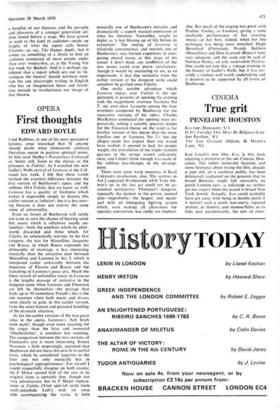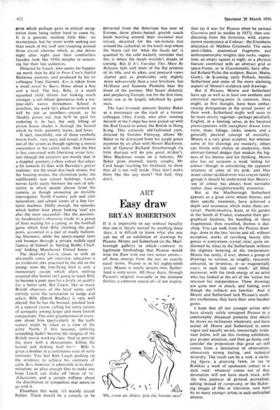CINEMA
True grit
PENELOPE HOUSTON
Kes (sac, Doncaster, 'U')
If It's Tuesday This Must Be Belgium (Lon- don Pavilion, 'A')
The Last Grenade (Odeon, St Martin's Lane, 'A')
Ken Loach's new film, Kes, is this week enjoying a premiere at the ABC Cinema, Don- caster. The rather recherche location, and some hesitance about trying the film, already a year old, on a southern public, has been defensively explained on the grounds that its broad Barnsley might fall uncouthly on gentle London ears—a solicitude we neither get nor expect when the accent is broad New York Jewish. Actually, Kes could probably have got away with being in double-dutch if it weren't such a small, non-starry, regional picture, as demotic and monosyllabic as its title; and, paradoxically, the sort of enter- prise which perhaps gains in critical recog- nition from being rather hard to come by. It is a genuine, resolute little film: no masterpiece, but far more worth seeking out than much of the stuff sent traipsing around those circuit cinemas which, as one drives night after night past their comfortless facades, look like 1930s temples in mourn- ing for their lost audiences.
Directed by Loach, who seems far happier up north than he did in Poor Cow's fretful Battersea pastures, and produced by his TV colleague Tony Garnett, Kes is taken from a small novel by Barry Hines about a boy and a bird. The boy, Billy, is a small squashed child, fifteen but looking much younger, a self-reliant ignoramus with a ten- year-old's native shrewdness. School is pointless; the work he's about to embark on will be just as pointless—except, as he bleakly points out, that he'll be paid for enduring it. In fact, the only lifting of prison house shades is through the kestrel which he finds, patiently trains, and loves.
It isn't, mercifully, one of those symbolic movie birds: very wary and actual, it frowns out of the screen as though sighting a mouse somewhere in the centre stalls. And the film is less concerned with liberating avian lyric- ism (though the exteriors are mostly shot in a dappled, greenery-yallery colour that edges a bit towards it) than with Barnsley's greyer realities: not the usual dire back streets, but the housing estates, the chromium pubs, the indifferently new school buildings. Loach moves fairly easily between the sort of tete- reality in which people almost front the camera, as though answering an invisible interrogator, North Country pub and club naturalism, and school scenes of a fine fan- tastic madness. Oddly enough, the episodes which bother least about looking 'real' are also the most successful—like the pessimis- tic headmaster's obsessive tirade to a group of boys waiting for a caning, or the football game which finds Billy climbing the goal- posts, accoutred in a pair of madly balloon- ing bloomers, while the sports-master trots and bounces through a private middle-aged fantasy of himself as 'balding Bobby Charl- ton' kicking Manchester United home.
The dead-end future closes in with an abysmally comic job interview; education is an irrelevant joke practised by the old on the young; even the free-flying bird is only a momentary escape which alters nothing essential (the kestrel isn't going to teach Billy to become a poet, pass his A levels, or qualify for a better job). But Loach, like so many British observers of the local scene, can't entirely resist the temptation to nudge and solicit. Billy (David Bradley) is very well played, but he has the bruised, pinched look of a natural victim, calling for extra rations of sympathy among larger and more loutish companions. The utter gracelessness of every- one about him (particularly in the early scenes) might be taken as a view of the gritty North, if this raucous, unloving screeching hadn't become the insignia of the British movie working-class. And to provide the story with a denouement, killing the kestrel and dashing frail ho--- Billy is given a brother in a continuous state of surly tantrums. You feel Ktn Loach pushing up the stridency to achieve his contrasts of calm. Kes, however, is admirable in its deter- mination; an alive enough film to make one hope Loach can shake off tloaces of Tv- didacticism, and a certain stiffness about the distribution of sympathies that seems to go with it.
Elsewhere this week, it's mainly circuit fodder. There should be a comedy to be
extracted from the American bus tour of Europe, those plastic-hatted, greyish coach loads hurtling around their insulated tour circuit, decanted for the ten-minute trot around the cathedral, or the lunch stop where the brave call for 'what the locals eat' is quashed by the cold waiterly reminder that this is where the locals wouldn't dream of coming. But If It's Tuesday This Must Be Belgium falls well short of the flip promise of its title, and its jokes, and postcard views chatter past as predictably only slightly more subversively than a tour brochure. Ian McShane and Suzanne Pleshette bear the brunt of the journey; Mel Stuart directed; and perplexing Europe, not for the first time, turns out to be largely inhabited by guest stars.
The Last Grenade presents Stanley Baker as a mercenary on the track of, a former colleague (Alex Cord), who after running berserk in the Congo has now joined up with the Red Guard to annoy the British in Hong Kong. This curiously old-fashioned yarn, directed by Gordon Flemyng, allows Mr Baker to be distracted from his jungle green purposes by an affair with Honor Blackman, wife of General Richard Attenborough little shut-eye will do you good, m'dear'). Miss Blackman weeps on a balcony; Mr Baker gives doomed, manly coughs; Mr Cord keeps touching his forehead, to show that all is not well inside. They don't make them like this any more? Not half, they don't.



































 Previous page
Previous page